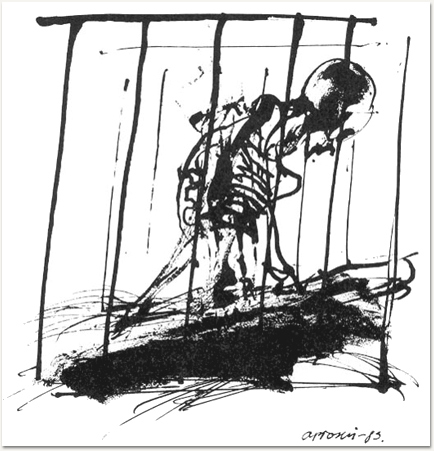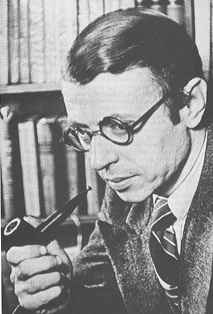Monday, January 31, 2011
Tuesday, January 18, 2011
A Pastiche: Hunger by Knut Hamson
My legs ached. I wanted so badly to sit down, but I knew I couldn't. I took a quick glance around, no benches, chairs, nothing. I knew what people would think if I sat right here, on the side of the street. No that was not acceptable, I'm no begger. I was a writer, and I would act like one, but oh, my legs, how they pained me. Just for a couple of minutes, no just one, I needed to sit. Again looking around, searching for a seat, somewhere. And then I saw the cafe on the other side of the road. Immediately I felt my legs taking me there. I entered. Soon, a waiter was at my service, taking me to my own personal table. Smiling, I went a long with him, feeling my stomach rumble a little from the smell of good food, ''I am a very picky eater, there are many things I just won't eat, they are not to my taste,'' I said. He eagerly responded saying that they had lots of variety in their food, surely I would like some of them, and after giving me a menu, he turned and left. I checked my pockets subtly. Five øre. I skimmed through the menu, growing more hungry reading the choices, there was nothing available for five øre. I set the menu down on the table, and got up. Seeing this the waiter came back, ''Is there anything I can get you?'' he asked politely. ''No, nothing in your menu pleases me, I shall eat elsewhere,'' with that, I left quickly. Did he doubt me? Did he realize I had no money to pay for his food?
Sunday, January 16, 2011
Forever Misunderstood.
The hunger artist starves himself willfully, for forty days in a cage for his living. In a sense, he is a professional at fasting, fasting has become his art. People from all over town come to see this man "perform", and he in return talks to them and answers their questions, he is content. Yet these people seem to think that the hunger artist is secretly eating, not believing in his fast is honest. This doubt of the people annoys the hunger artist more than anything else, his audience, his fans don't believe in him? He depends on his fans, needing them to believe him, to understand him, he needs them to applaud his performances, to be amazed by him, without that, what is the point of staying hungry? What is the point of fasting for so long, when it won't be acknowledged? Yet every artist, whether they're authors, visual artists, musicians, or hunger artists, starts out wanting to make his/her art for themselves, to express themselves. Here we see that the hunger artist is living in a paradox, making his art for himself, not conforming, not knowing how to express himself in any other way, yet if the art that is produced is not accepted or liked by the given audience then why create it, why make it your living, why create art, why starve? This paradox that essentially defines the hunger artist's life, is the reason for his unhappiness.
A Hunger Artist, is written by Franz Kafka, in 1922.
The story of the hunger artist is parallels the life of Jesus Christ. Like the hunger artist, Jesus "performs" miracles for his people, yet no one has faith, no one believes in this miracles, his followers hold suspicions. (Jesus also fasts for forty days, which Kafka mirrors in A Hunger Artist.) Both Jesus, and the hunger artist, want the belief of their fans, or followers, yet they do nothing to prove themselves to them because they want the belief to be genuine.
Kafka's story could also be an allegory to his own life as an artist, a writer. As any writer, or artist starts off writing for themselves, his writing keeps true to his own beliefs, he expresses himself through his writing. Now if one of his pieces is extraordinary, the writer has fame. But the next piece he creates may not be as great, now the writer must think of new ways to entertain his audience, but by having to "entertain" them, he is being ruled by them. The writer is no longer his own, his words, his pieces, aren't for him, but for unknown readers who will judge him in the harshest ways. This realization is not a happy one, yet if the writer wants writing to be his living, if he wants money, food, and other necessities, then the writer has to conform. Here we see an allusion with the hunger artist, living in somewhat of a paradox, the writer cannot be without his audience, or but strives to keep his individuality.
Here we can also see an a parallel to Hunger by Knut Hamsen. The protagonist also lives in this paradox, his pride does not allow him to comply with how the editors want him to write, he never lets himself be restricted, but realizes that without changing his writing, no one will take them, leaving him poor and extremely hungry. Yet this hunger and poverty is self inflicted, and could be easily changed, here we see how the protagonist in Hunger differs from the hunger artist, or Jesus, as he does not need his audience, because of his pride, he doesn't have fans, or followers but he never really wanted them either.
A Hunger Artist, is written by Franz Kafka, in 1922.
The story of the hunger artist is parallels the life of Jesus Christ. Like the hunger artist, Jesus "performs" miracles for his people, yet no one has faith, no one believes in this miracles, his followers hold suspicions. (Jesus also fasts for forty days, which Kafka mirrors in A Hunger Artist.) Both Jesus, and the hunger artist, want the belief of their fans, or followers, yet they do nothing to prove themselves to them because they want the belief to be genuine.
Kafka's story could also be an allegory to his own life as an artist, a writer. As any writer, or artist starts off writing for themselves, his writing keeps true to his own beliefs, he expresses himself through his writing. Now if one of his pieces is extraordinary, the writer has fame. But the next piece he creates may not be as great, now the writer must think of new ways to entertain his audience, but by having to "entertain" them, he is being ruled by them. The writer is no longer his own, his words, his pieces, aren't for him, but for unknown readers who will judge him in the harshest ways. This realization is not a happy one, yet if the writer wants writing to be his living, if he wants money, food, and other necessities, then the writer has to conform. Here we see an allusion with the hunger artist, living in somewhat of a paradox, the writer cannot be without his audience, or but strives to keep his individuality.
Here we can also see an a parallel to Hunger by Knut Hamsen. The protagonist also lives in this paradox, his pride does not allow him to comply with how the editors want him to write, he never lets himself be restricted, but realizes that without changing his writing, no one will take them, leaving him poor and extremely hungry. Yet this hunger and poverty is self inflicted, and could be easily changed, here we see how the protagonist in Hunger differs from the hunger artist, or Jesus, as he does not need his audience, because of his pride, he doesn't have fans, or followers but he never really wanted them either.
Monday, January 10, 2011
"How like human nature!"
In Existentialism is a Humanism, Jean-Paul Sartre discusses what is considered the central claim of existentialism, the proposition that "existence comes before essence" (3/18). He begins this piece by defending against the reproaches and criticisms made about existentialism, trying to prove that it is not really as pessimistic as it seems.
Essence is the attributes that make an object what it is, and without it's essence, the object loses its identity. An essence is never predetermined in a person, its constituted by them and how they make their decisions. Existence precedes essence, a notion that basically means that even though a person exists, nothing can control a person's character, choices, and desires. No "Man simply is. Not that he is simply what he conceives himself to be, but he is what he wills," (4/18). Sartre explains that this is the first principle of existentialism: that man is nothing but what he makes himself, saying that man is responsible for who he is and for his behavior. "Man first of all exists, encounters himself, surges up in the world – and defines himself afterwards," (3/18). Sartre goes on to say that this responsibility extends further than over just the man, but also for all of mankind. Once the man fully recognizes this "profound responsibility" placed on his shoulders, he feels begins to feel anguish and despair.
Subscribe to:
Comments (Atom)


